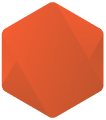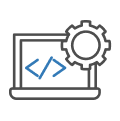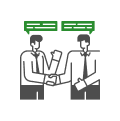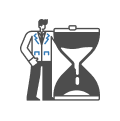Desktop applications of any complexity

Desktop applications of any complexity
- Native Desktop Application Development:
- Windows Desktop Applications:
– C# with WPF (Windows Presentation Foundation): Provides more modern and flexible UI options.
– C++ with WinAPI: Offers full control over Windows-specific features
– C# with Windows Forms: Obsolete technology but still useful in some cases - macOS Desktop Applications:
– Swift with SwiftUI: Apple’s modern, declarative UI framework for macOS applications.
– Objective-C with Cocoa: Traditional macOS development stack. - Linux Desktop Applications:
– GTK (GIMP Toolkit): A popular choice for creating Linux desktop apps.
– Qt: A cross-platform framework for C++ developers that also works on Linux.
- Windows Desktop Applications:
- Cross-Platform Desktop Application Development:
Cross-platform development allows developers to create applications that run on multiple operating systems with a single codebase. Here are some common technologies:- Electron:
– Built using web technologies like HTML, CSS, and JavaScript.
– Allows developers to create cross-platform desktop apps for Windows, macOS, and Linux.
– Used by applications like VS Code, Slack, and Discord. - JavaFX:
– Java-based framework for creating cross-platform desktop applications.
– Offers a wide range of UI controls and features.
– Works on Windows, macOS, and Linux. - Avalonia:
– A cross-platform XAML-based framework for .NET, similar to WPF.
– Targets Windows, macOS, and Linux.
And of course, all these approaches can be mixed. It’s always possible to write some code in C++ , for example, and integrate it with other technologies.
- Electron:

Founder of Kvinivel Inc
Call +1 (587) 973 5725

You need a desktop application if
You require professional software that is designed to process a significant amount of data.
Image editors, video editors, digital audio workstations, CAD software
You have unique security requirements.
You would like to avoid transferring sensitive information across any network.
Application requires special hardware
Professional measurement tools, medical equipment, development tools for specific platforms, etc.
Users will often work in disconnected environments like planes
Article editors for reporters

Desktop applications –
What for?
Customization: You have full control over the design, features, and functionality of the application. You can tailor it precisely to your unique requirements, ensuring it meets your business or personal needs.
Offline Access: Desktop applications run directly on the user’s computer, so they can be used without an internet connection.
Performance: Desktop applications often provide better performance compared to web-based counterparts. They can take full advantage of the user’s computer resources, resulting in faster execution and smoother user experiences.
Security: You can implement robust security measures to protect sensitive data and ensure a high level of security for your desktop application. This can be especially important for applications that handle confidential information.
Offline Data Storage: Desktop apps can store data locally on the user’s machine, allowing users to access and manipulate data quickly without relying on remote servers.
Greater Control: You have greater control over updates and maintenance.
Integration: Desktop applications can seamlessly integrate with other software and hardware on the user’s computer, allowing for advanced functionalities like interacting with hardware peripherals or connecting to local databases.
Brand Recognition: Custom desktop applications can help establish your brand identity and professionalism, which can be especially important in business and enterprise settings.
Monetization: If your application has commercial potential, you can explore various monetization models, such as selling licenses, subscriptions, or offering a premium version, to generate revenue.
Offline Backup: Desktop applications can offer users a way to create local backups of their data, which can be crucial for data protection and disaster recovery.
Specialized Functionality: For niche or industry-specific needs, desktop applications can provide specialized functionality that may not be readily available in off-the-shelf software.
No Browser Limitations: Unlike web applications, desktop apps are not subject to browser limitations, compatibility issues, or dependencies on browser updates.
Reduced Latency: Desktop applications can offer lower latency and faster response times, making them suitable for applications where real-time interactions or high-speed data processing are critical.
Why collaborating with Kinivel will result in positive outcomes?

Development
We provide a team of experienced developers and testers led by skilled managers. You get a fully finished product with a package of documentation and technical description. We also provide support and additional services.

Cooperation
You can track the development process and make adjustments to the process. Produced real time tracking with detailed reporting

Payment condition
We discuss the payment system with the client in advance. You can choose both a fixed development price and hourly payment for the project. We also practice using customer tracking systems or upwork.

Free consultation
You can get advice on the development you are interested in absolutely free. We will answer all your questions.
What is next?

We discuss possible options for implementation, payment, conditions and all your questions and details of possible cooperation. You make the decision about bargain.

Development and testing of the solution. Flexible system for making changes. Real-time tracking of implementation.

Ready-to-use solution. Technical support and services could be provided.

